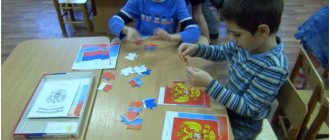MAGAZINE Preschooler.RF
“Features of moral and patriotic education of children of primary preschool age”Early preschool age is an important period in the social and moral development of children. At this age stage, children are actively developing their first elementary ideas about good and bad, behavioral skills, and kind feelings towards the adults and peers around them. This occurs most successfully under conditions of favorable pedagogical influence in kindergarten and family. Those moral feelings, ideas and skills that are formed in children at this age, the moral experience that they accumulate, will form the basis for their further moral development.
Children in their third and fourth year of life have a great need for affection and attention from an adult. Children are still largely dependent on adults. This is due to the lack of basic hygiene and self-care skills in children, the ability to play, study independently, and communicate with others. That is why one of the most important tasks in raising children of primary preschool age is the formation of independence in various types of activities. Children should be taught to do for themselves what they can do and what suits their life experience. Having acquired independence, the child can not only serve himself, but also gets the opportunity to maintain order in the environment, follow a number of rules without resorting to help, i.e. manage your behavior. By the age of three, qualitative changes in the growth of independence are observed. This allows the teacher to place higher demands on children: to establish contact with friends in play, when carrying out assignments, to create an environment for common activities with peers, to take into account the interests and desires of others, and to provide assistance. By including children in individual and joint activities, the teacher trains them in good deeds, develops humane feelings, makes them want to obey, and treat others with respect. Thus, in children of the third year of life, an adult teaches the ability to greet, thank, politely make requests to elders, play next to other children without disturbing them, take care of other people’s buildings, calmly wait for a friend to play with a toy, and teach them to put toys away.
In the second junior group, the teacher consolidates the ability to warmly address adults and children with requests, provide small services to others, play with peers, give away toys and books, and teach compliance with basic rules in didactic and outdoor games.
The children are involved in preparing the table for breakfast, lunch, and in carrying out tasks for caring for plants. To implement these tasks, the teacher uses imitation as a specific feature of children two to four years old. An adult shows by his own example a positive attitude towards work, towards people around him, towards children.
Children of primary preschool age are characterized by great emotional responsiveness, which allows them to successfully solve the problem of nurturing good feelings and relationships towards people around them. It is very important that the teacher maintains a positive emotional state in the children: responsiveness to his proposal, request, a sense of empathy when seeing the grief of another. Children are taught to love their loved ones and to want to do something good for them. This is achieved through adults’ approval and praise of the child’s manifestations of kind feelings towards others.
In the fourth year of life, the teacher continues to instill in children sympathy for their friends, the desire to be good, kind, and instills in the child that they should be ashamed of their bad deeds. Particular concern is the cultivation of cheerfulness and self-confidence. Young children already have a fairly pronounced need to play together with peers and communicate with them. This social need is a prerequisite for the development of friendly relationships, which also constitutes an important educational task. At the same time, the teacher teaches children to notice violations of the rules of relationships (pushed, took away a toy).
At three years old, the desire to communicate with other children becomes especially strong. The level of development of the children allows them to understand the actions and speech of their peers, communicate with them, and agree on playing together. In the company of children, the child learns to correlate his desires with the desires
another child and the whole group of children. Three-year-old children can already be good, responsive companions. All this obliges the teacher
to develop in children of the second youngest group the ability to treat younger children kindly, at the request of an adult, to take care of a newcomer,
about children who came after illness to teach another what he can do himself.
In games, in everyday communication with peers, children imitate
adults, show mutual attention, care, and politeness. In the second junior group, intensive formation of skills and habits of cultural behavior occurs. Motives play an important role in this. The motivation of a child’s activities, his actions, and relationships contributes to the establishment of unity between external forms of cultural behavior and his morally significant motives.
Since four-year-old children are able to carry out basic instructions from adults, to be guided in their behavior by the rules: “This is possible, but this is not possible ,” they begin to understand the simplest motives of social significance: to do something useful for their peers and adults. This obliges the teacher to organize any activity of children and their behavior in such a way that, along with the motives of interest in the action itself, in the process, the desire to earn the approval of others, to form moral motives - to be needed by others (peers, adults).
Children of the fourth year of life do not yet know how to correlate ideas about a moral standard with their actions. In addition, the children have very poorly developed self-control - the ability to consciously manage their behavior. In this regard, they often act under the influence of feelings and desires that flare up under given circumstances, forgetting about the requirements of the teacher. This is why the moral habits and actions of children under four years of age
are often situational in nature, i.e. appear in some conditions and not in others. However, during the interaction between the kindergarten and
family, organization of pedagogically valuable everyday communication, as well as joint activities accessible to children of the fourth year of life with
adults and peers solve the problem of forming stable habits much more successfully; culture of behavior, relationships with
surrounding people begins to change from situational manifestations to extra-situational ones.
In the period from three to four years, children actively master speech. They begin to understand the surrounding phenomena and give basic
verbal assessments. The teacher uses intensive speech development, greater child activity and emotionality to introduce children to
the world around us, with people, with the rules of relationships.
Pupils of the first junior group must learn that they need to play together, study, not offend each other, not take away toys, but ask
They are polite, take care of furniture, books, and handle them carefully. Children develop the idea that they should love animals, birds, and protect
plants. The children begin to understand that their elders make sure that they have a good time in kindergarten, and that adults must be treated with care.
Children of the second youngest group not only consolidate these ideas, but also form new ones. This is how the guys learn that they need to take care of furniture,
clothes, shoes because the labor of adults was invested in them. Children learn that all people work: they build houses, make cars, grow bread, vegetables
etc., help each other. Children understand that taking care of children and helping adults and peers is good. Children develop
ideas about truthfulness: one must tell the truth, tell everything to family, friends, and educators. Thus, already in junior preschool
At this age, children begin to form elementary ideas about the phenomena of social life and the norms of human communication.
The cultivation of good feelings, positive relationships, and the simplest moral manifestations occurs in everyday everyday activities, in play, and is associated with the formation of these activities.
Prepared by: teacher Zakharova Natalya Grigorievna MBDOU No. 4 “Ivushka” .
| Next > |



